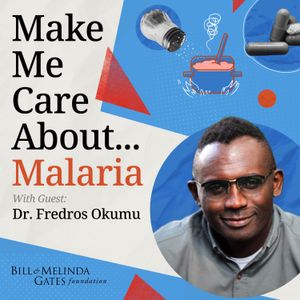
Make Me Care About
Bill & Melinda Gates Foundation
Make Me Care About Malaria
JUN 7, 202317 MIN

Make Me Care About Malaria
JUN 7, 202317 MIN
Description
<p>Do you know what the deadliest animal is on the planet? From movies and TV shows, you might be thinking sharks, but that's wrong (sharks kill about five people a year). The answer is…mosquitoes. They are the deadliest animals on the planet by a long shot, and their biggest threat: malaria. Many of us have taken malaria pills before traveling without thinking twice about malaria itself. But how does malaria actually impact us? Malaria has devastated the sustainability of communities and the global economy. And in the words of this episode’s guest, Dr. Fredros Okumu, “It’s better to be alive than to be dead”.</p><br><p>This episode features Jen Hatmaker, an American author, speaker, blogger, and television presenter, in conversation with Fredros Okumu, parasitologist and Director of Science at the Ifakara Health Institute in Tanzania, Africa. Jen and Fredros discuss how malaria is a disease for which we know the cause, the treatment, and how to effectively prevent it. Still, over half of the world population is currently at risk of malaria, and it kills 600,000 people annually, most of which are young children across the African continent. Like COVID, malaria affects us all through its impact on global economic growth, health, and travel. With investment and early interventions, including mosquito control and adequate diagnostics and treatments, we can reduce the disease burden and increase global health equity and dignity.</p><br><p>Make Me Care About is produced by Magnificent Noise in partnership with The Bill and Melinda Gates Foundation.</p><br><p>To learn more about our show: https://www.gatesfoundation.org/podcast/make-me-care-about</p><p>For more on The Bill and Melinda Gates Foundation’s work: https://www.gatesfoundation.org</p><p>To learn more about malaria:</p><p>Malaria Strategy: https://www.gatesfoundation.org/ideas/articles/food-fortification-to-fortify-the-future</p><p>What will it take to outsmart malaria?: https://www.gatesfoundation.org/our-work/programs/global-health/malaria</p><p>Why the Interceptor G2 net could be a game changer for malaria eradication: https://www.gatesfoundation.org/ideas/articles/ig2-nets-malaria-eradication-financed-by-the-global-fund</p><br><p>For more on the work of our guest, Fredros Okumu: https://en.wikipedia.org/wiki/Fredros_Okumu</p><p>Learn more about our host, Jen Hatmaker: https://jenhatmaker.com</p><p>Our production staff includes Sabrina Farhi, Hiwote Getaneh, Julia Natt, and our sound designer Kristin Mueller. Our Executive Producer is Eric Nuzum and the host is Jen Hatmaker.</p><p><br></p><hr><p style='color:grey; font-size:0.75em;'> Hosted on Acast. See <a style='color:grey;' target='_blank' rel='noopener noreferrer' href='https://acast.com/privacy'>acast.com/privacy</a> for more information.</p>